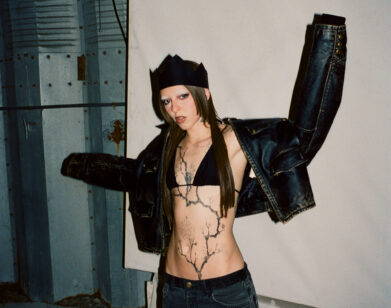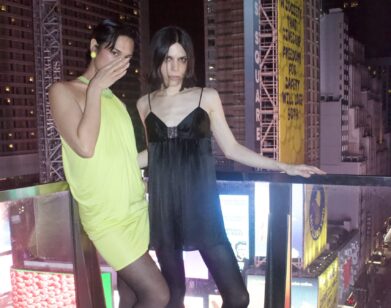Pajaro Sunrise Wakes Up

ABOVE: YURI MÉNDEZ JR., A.K.A. PAJARO SUNRISE
Translating to “Bird Sunrise” in English, Pajaro Sunrise is a peculiar alias that aligns with the bittersweet texture of Yuri Méndez Jr.’s songs. His lyrics tell of lost love and forgotten memories, woven into a pop-folk canvas of driving rhythms and electronic undercurrents. But there’s more depth to Méndez than his romantic leanings imply: boldly titled Kulturkatzenjammer, his fourth album is underscored by a range of hidden cultural and social meanings stemming from American writer Dwight Macdonald’s essay “Masscult and Midcult.”
Prior to the album’s production, Méndez took a year off from playing live in an effort to absorb as many influences as possible, a process that left him reeling in the wake of our digital culture’s musical over-supply. There’s a clear link between the album title and this experience, one expressed in the clarity of the music itself. It’s as if Méndez soaked in so much that it left him with a fresh, clear vision, one ensconced in more contemporary electronic leanings than his previous records let on. On the eve of Kulturkatzenjammer‘s release, Méndez tore himself away from a soccer game to tell us the record’s story—and his, along the way.
TEMPE NAKISKA: So why the German title, Kulturkatzenjammer?
YURI MÉNDEZ JR.: I stole it from an American writer named Dwight Macdonald, who translated it to mean “cultural nightmare.” I drew parallels with my home country: in Spain with the economic depression and Germany being the center of Europe. I thought it went with the times. It’s a messed-up title for messed-up times.
NAKISKA: Are there other meanings, too?
MÉNDEZ: Yes, well, in the German language, words and phrases are always morphing into other things, so there are several ideas behind it. It relates to us as listeners who have masses of music available to us to listen to. It behaves as information, in a way. I like it because it means both things at the same time. Having been playing live for so long, I got to a point where I just wanted to be a listener again. To forget about playing and writing and just take time to really discover why I love music in the first place.
NAKISKA: How overwhelming was the process of really going back to listening?
MÉNDEZ: I found it overwhelming in an abstract way. These days you turn on your computer and there’s a whole universe of music there. But it’s only overwhelming if you want to know everything. For instance, for you being a journalist you have to know what is going on and when new music is being released. That must be hell! But for me it’s great, because for me it’s pleasure.
NAKISKA: [laughs] What were you listening to during that time?
MÉNDEZ: For a time I only listened to classical music, because I was tired of pop music. I love Schubert and Bach. I dug deeper in electronic music too, I discovered John Maus. That’s been like a torch in the dark. The way he uses sound and is respectful of everything. I know that doesn’t exactly translate into everything I do but it’s something. I love Four Tet, Nicolas Jaar, DJ Cosi, Caribou… Some of those bands I listened to before, but this time around I was really focusing on the sound.
NAKISKA: And you can hear how your sound has evolved quite a lot. It’s more beat-oriented and lyric-focused. How did that happen?
MÉNDEZ: It just kind of happened. I was writing for fun, so I didn’t think in terms of genre or style. The influences probably had a big impact, but I think it was also an organic process.
NAKISKA: So what kind of music were your parents exposing you to when you were a kid?
MÉNDEZ: It’s funny, because my parents aren’t very musical, actually. But they had a small club in our town in Spain, and there was a lot of flamenco music. I think they had some pop records, but they didn’t play them much. I only really started listening to music properly when I was about 12. I think it was The River by Bruce Springsteen where I started loving music; I think that was the beginning of everything.
NAKISKA: You can definitely feel those rock and pop influences in your music.
MÉNDEZ: The first things you listen to as a teenager, they leave a mark on you. As you grow older your tastes develop but those early records, like Bob Dylan, that has stayed with me a long time.
NAKISKA: And what about your cultural background, has it influenced you in any way?
MÉNDEZ: When I was in high school, all my friends were into heavy metal. We didn’t want to relate too much to our culture and the bands that were based in our area or country. I really wanted to run away from my hometown and that background when I grew a bit older. I think you often become too close to that background and need to escape a bit. I’m sounding like a yogi! [laughs]
NAKISKA: Ha! Wise words. So have you done much travelling?
MÉNDEZ: Mostly through Europe and Japan. I love Japan; the food is incredible. I think I belong in Japan.
NAKISKA: I think everyone belongs in Japan, it’s amazing. So did you travel to Bali to film the clip for “Good To See You”?
MÉNDEZ: Unfortunately I didn’t get to go, no. It was actually an accident. The guy who made the clip had an idea of making people stare at the camera and making them feel and look uncomfortable. But it just didn’t work because the people there were too nice and wanting to please.
NAKISKA: The lyrics in that track are happy but sad at the same time. Actually, that’s a theme that seems to run through a lot of the album. Do you take from others’ experiences or are they mainly informed by your own?
MÉNDEZ: That was a time of thinking over a lot of things in my life, mainly about music and relationships. It’s that bittersweet thing, because when you get rid of memories or past times there is something nice and new to come—but it’s sad because you’re losing memories or people or a way to live your life. A lot of the lyrics are very introspective. Maybe they are actual experiences, but they are also moods. In this case I have an image in my head or a physical image to look at and it creates a mood, and I go along with that mood.
NAKISKA: Are you preparing to tour at the moment?
MÉNDEZ: Yes, I’m getting ready to tour next spring when I have a tour in China. I have a new label there, and so I will go and do a band of shows there. It’s perfect because I’ve never been to China before. Right now I’m in Spain living the small cultural life so I don’t see a reason not to go there. That’s all that’s planned at the moment.
NAKISKA: You haven’t played live in such a long time, how do you feel about doing a tour of that size?
MÉNDEZ: Well, I feel ready now; I had a couple of gigs in Barcelona a couple of weeks ago, and they went really well. I wanted to see how I felt, and it felt good. I like playing live but I enjoy recording music more. I see playing live as a very different thing, both things serve different purposes. Right now I’m more into recording and writing than playing live, but maybe that will change as soon as I start playing more gigs.
NAKISKA: What is the hardest thing about what you do?
MÉNDEZ: I guess right now it’s doing it by myself. I don’t have anyone to lean on or discuss the music with. It’s only me and my nightmares! But I want it to be this way for the moment, so I can’t complain.
PAJARO SUNRISE’S KULTURKATZENJAMMER IS OUT NOW. FOR MORE ON THE ARTIST, PLEASE VISIT HIS FACEBOOK PAGE.






